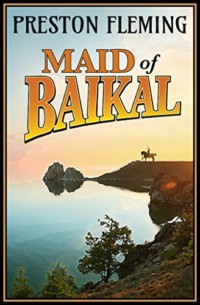Title: Maid of Baikal: A Novel of the Russian Civil War
Author: Preston Fleming
Publisher: PF Publishing
ISBN: 978-0-9994418-0-0
Pages: 529
Genre: Historical Fiction
Reviewed by: Thomas Macolino
Pacific Book Review
Preston Fleming’s alternative historical narrative, Maid of Baikal, takes the reader back to the frozen fields of Russia just as World War I is winding to a close. Fleming’s novel imagines how events might have changed if Russia had been given its own Joan of Arc figure, named Zhanna of Baikal. Rich in detail and the complexities of historical nuances, Maid of Baikal offers a comprehensive and immersive look at the Russian Revolution.
There are some books we pick up lightly at the library or at a bookstore on a whim, reading a few pages here and there when we have time; this is not one of them. Maid of Baikal is the type of book which does not ask but demands your full attention. Fleming’s novel deals with historical events which tend to get very little attention aside from a cursory paragraph or two in general historical books‒ such as a footnote at the end of the discussion of World War I. Fleming knows this, and to his credit, his novel is full of historical exposition, helping the reader to understand issues they might have had no background knowledge of before. I must confess, I knew next to nothing about the Russian Revolution going into this. Yet exhibiting a skill of the author I never felt lost while reading Maid of Baikal. Due to the reveal of vast information needed to comprehend the story, Fleming’s novel has a slow start requiring a patient reader to follow the stories through the background information and setting of the stage. Once immersed, the benefits of the background will make this an unforgettable read.
That being said, Fleming’s novel holds within its heart the finest quality of the historical fiction genre; it does not just entertain, it also informs. The best historical fiction takes the reader on a journey through a world made alien to us by both space and time. As we read, like tourists we begin to pick up the local language and customs, until by the end of our travels we actually have begun to understand the place where we were once strangers. In this, Fleming is both the author and our excellent tour guide. Perhaps he can be a little verbose at times, but if you pay attention to what he has to say, you’ll definitely learn a lot of interesting things.


